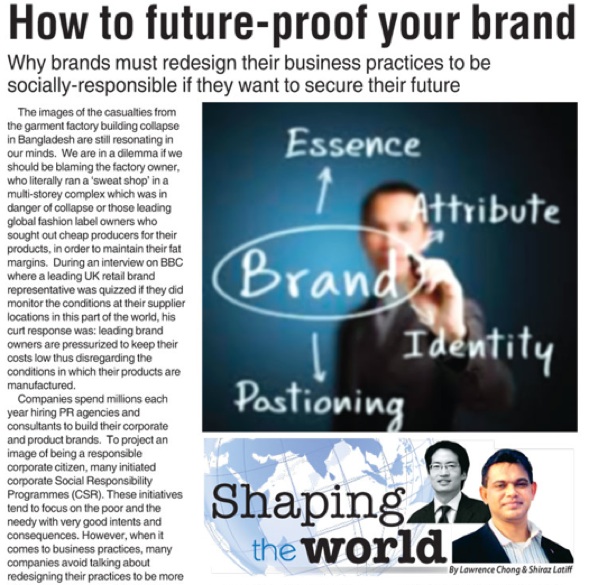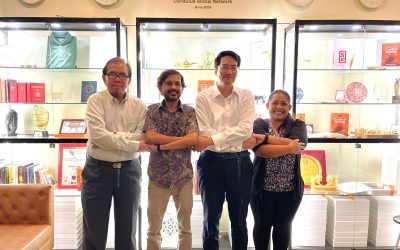
SOURCE: Ceylon Today
The images of the casualties from the garment factory building collapse in Bangladesh are still resonating in our minds. We are in a dilemma if we should be blaming the factory owner, who literally ran a ‘sweat shop’ in a multi-story complex which was in danger of collapse or those leading global fashion label owners who sought out cheap producers for their products in order to maintain their fat margins. During an interview on BBC where a leading UK Retail brand representative was quizzed if they did monitor the conditions at their supplier locations in this part of the world, his curt response was: leading brand owners are pressurised to keep their costs low thus disregarding the conditions in which their products are manufactured.
Companies spend millions each year hiring PR agencies and consultants to build their corporate and product brands. To project an image of being a responsible corporate citizen, many initiated corporate social responsibility programmes (CSR). These initiatives tend to focus on the poor and the needy with very good intents and consequences. However when it comes to business practices, many companies avoid talking about redesigning their practices to be more socially responsible. This is where the disconnect happens. While companies are prepared to do good for the needy by losing money once a while, they do not believe that they can do good everyday and still make a profit. This is no longer a sustainable position as we are witnessing the rise of a more socially-conscious consumer.
The Bangladesh debacle is a classic example. Due to the incident, global brands like Disney and Nike are now under pressure to ensure better working conditions at their supplier’s factories. In another related case, Apple had to step in to allay consumer concerns and review Foxconn’s working conditions after a few workers committed suicide. The 21st century consumer wants to buy products that look and feel good. To ensure the latter, companies must be prepared to review their supply chain, work practices to deliver sustainable value instead of seeking profit margins at all costs.
This phenomena has come about due to the emergence of 3 recent trends. Asian companies seeking global dominance must take note in order to meet the demands of a changing world:
1st trend: A connected world creates a more empowered class of consumers.
When the pictures of garment workers crushed to death in Dhaka were beamed around the world, people went online to express their grief. Some even went on to seek out who were the global brands associated with these factories and began to call for a boycott. This forced global brands to issue immediate responses and a commitment to review working conditions. In the past without the internet, public reaction was slower allowing major brands to activate their PR mechanisms. But today, faced with a tsunami of instant tweets or comments from around the world, brands with poor business practices are in a real danger of suffering from ‘sudden death’ in terms of brand reputation.
2nd trend: The rise of the socially-conscious generation
A more educated generation means people are motivated to try and make a difference. From the streets of Mumbai to the malls of Hong Kong, customers are increasingly ignoring the messages in advertisements and investigating the sources of products, how they are made and their impact on the environment. With almost 3 decades of social activism by global NGO brands like Greenpeace, human rights watch, religious groups, global agencies like the UN, it has raised social consciousness among people, increasing the demands for brands to be socially responsible.
3rd trend: The emergence of iconic socially-responsible brands
The new normal also means that consumers now have more passion for brands that start out from a social responsibility angle. Entrepreneurs like the late Anita Roddick, founder of Body Shop and Elon Musk, founder of Solarcity, Tesla and SpaceX proves that you can build socially-responsible brands and still be a profitable global business.
Therefore it is time for Asian brands to stop remaining as low wage pay masters and to move up the value chain through invention and be socially responsible. It requires a change in mindset because the new world is not about consuming more but why and what are we consuming. Any company that have a vision for a more sustainable future will end up with the biggest part of the pie. It is still not too late and here are 4 ways to future-proof your business by being socially responsible:
1) Why are you important?
This question tends to force leaders to examine themselves in a more thorough way. For example if you were to review your value to suppliers -other than providing revenue opportunities – what value do you bring to the industry? Are you a core technology or platform provider or are you simply one of the agents delivering a valuable service or product? At times, when we do review sessions with senior management, they begin to realise that they are only important to some suppliers and not the rest. This helps leaders in making a more conscious decision to transform their business models. The same question when applied in the context of customers may draw similar conclusions. Once you have understood the value of your company in an honest and meaningful way, you will be able to rally the team to work towards it. In the process some people might get disappointed when they are presented with this hard truth. But once people are clear about what they must do in order to help the company rise in importance, there will be a strong sense of will to get this done.
2) WHAT DIFFERENCE DO YOU MAKE?
Many Asian companies talk about offering value-add or delivering good value. But to be ready for the future, you need to do more than that. How your business shape minds and lives matter and you have to identify the difference that your services or products bring to the world. If you only fulfill a need, then it can be easily replaced. But if you help to change someone’s view and contributed to a more sustainable future, then most probably you will be a business that has a lot more room for growth. Therefore if you are selling food, is it just food or is it about culture? How about a smartphone, are you enriching lives? Most of the time, we noticed that once companies realise this, they gain more business opportunities because they can now see beyond the obvious.
3) HOW DOES CURRENT CULTURAL TRENDS IMPACT YOU?
As the world change around us, leaders need to review the societal and cultural trends and ask what it means to their brands. For example, during this long period of slowdown in the West, many people are beginning to question high executive pay or how corporations pay their taxes. This affects the perception people have of global brands. How about the impact of social media serving as platforms for consumers to become activists. For example, once activists started calling for a ban on the sale of sharks fins in Singapore, consumers started to follow up on these calls. So supermarket chains started to respond by banning the sale of shark fins on their premises. These and other examples show how these trends can seriously impact how you run your business. Increasingly we are helping clients to set up a trends analysis tracker and how it will impact the business. This helps them to plan ahead and be prepared in terms of resource planning and manpower development.
4) WHAT IS THE VISION?
At the end of the day, if your brand has no vision to lead the industry and shape a better world, you will end up poorer. A good reputation developed through standalone CSR programmes is no longer sufficient. Companies have to design their practices and people development programs with twin perspectives of sustainability and social responsibility in mind. With a more inter-connected world, it is also harder to hide poor or unsustainable practices. Therefore, it is best to think ahead and lead the future. We live in an extraordinary time when the human race has all the knowledge and resources needed to make poverty history, protect the earth and maximise human development. But more often than not, it is the lack of will and vision which are the real reasons why we are not moving closer to solving the world’s problems. As we build a new Asia, let us not build an Asia that only knows how to consume. Let us build an Asia that knows how to conserve, show concern and knows how to be creative in building a more sustainable world.
Lawrence Chong is the CEO of Consulus, a company specializing in helping Asian firms rebrand and redesign their organizations to be more innovative through business design. Consulus has begun operations in Sri Lanka in partnership with Hummingbird International. Shiraz Latiff is the CEO/Lead Consultant of Hummingbird International, a regional knowledge house specializing in coaching, consulting & outsourcing through global partnerships & collaborations.
This article is part of a weekly column called Shaping the World where Lawrence and Shiraz share insights and ideas about building innovative Asian Brands. It is published by one of the leading dailies in Sri Lanka, Ceylon Today.




